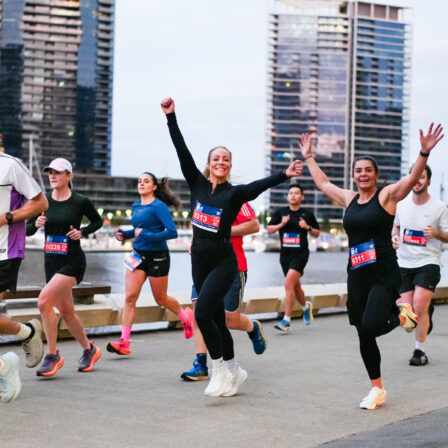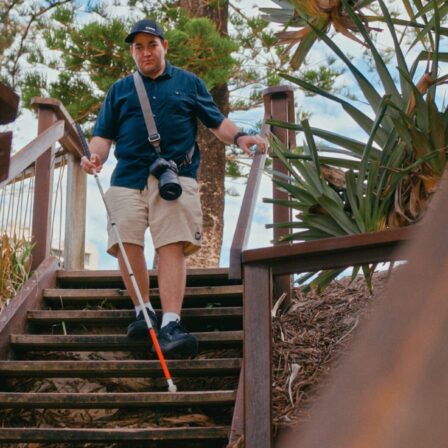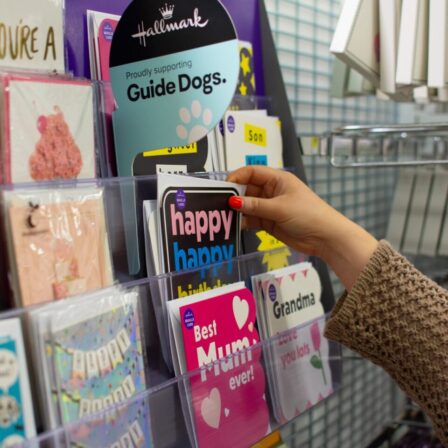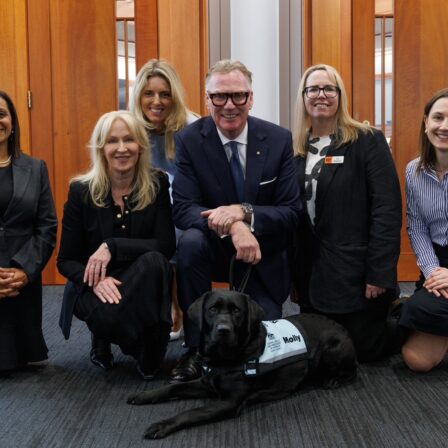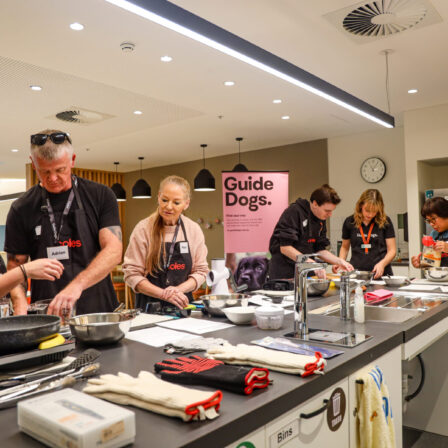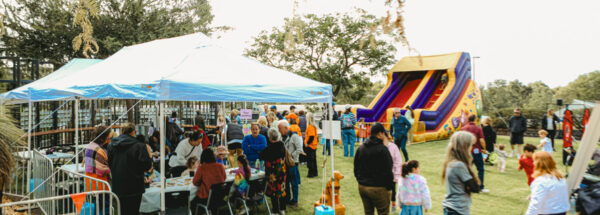News
Running with vision loss: From Achilles Melbourne to the Berlin Marathon
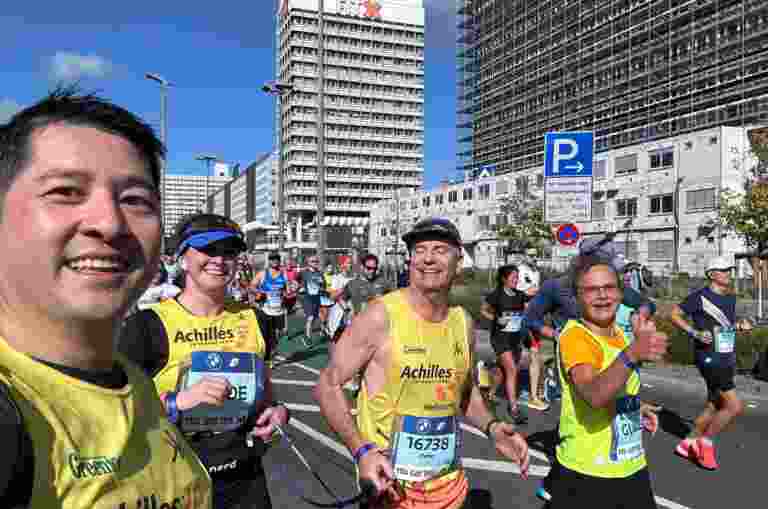
Achilles Melbourne, part of the global organisation Achilles International, supports athletes with disabilities worldwide, creating a space for runners and walkers of all abilities to stay active in their community and connected through athletic programs. In Melbourne, the club primarily consists of members with low vision or blindness, and it pairs them with sighted guides who volunteer their time to assist on runs. In September 2024, a dedicated member of Achilles Melbourne and long-standing Guide Dogs Victoria (GDV) Client completed a major milestone: the Berlin Marathon. Peter’s story demonstrates the impact of Achilles and the value of joining this inclusive community.
Finding a community in Achilles
Joining Achilles in 2018, Peter was motivated to become a member of the club after transitioning back into outdoor running with the support of a sighted guide. Though he had run as a junior and young adult, he paused for many years as his vision loss progressed around the age of 24. Now, at the age of 58, Achilles has provided the structure and companionship he needed to safely return to the sport, and over time, the club became much more than just a Sunday morning activity.
Today, his Achilles teammates form a large part of his social circle. “It’s more than just Sunday mornings, we [members of Achilles] join up with other guides privately outside of the club and go on runs or train doing the week.”
With regular training sessions, park runs, and organised events, the club offers numerous ways for members to be active and stay connected. For him, the social aspect is just as meaningful as the fitness aspect.
The club’s international reach also means that members can connect with Achilles groups worldwide. “Achilles is an international organisation, so if I was going to the UK for a holiday, I’d just email Achilles UK and say which parkrun I want to do on the weekend and they will arrange a guide to meet me there to do it.”
Preparing for Berlin: A global event
The Berlin Marathon was a significant goal. Preparing for the course, which spans a whopping 42.195 kilometres, took commitment and months of training. While Achilles can provide free support and coaching to assist members in reaching their goals, Peter chose to train with the support of a private coach to keep his goals on track, gradually building up his stamina and speed. Achilles also provided logistical and emotional support, including access to volunteer guides during group training sessions and encouragement from other members.
Prior to the marathon in Berlin, he had the chance to meet and socialise with other runners from different countries at a dedicated dinner for Achilles International members, underscoring the organisation’s widespread influence and support network.
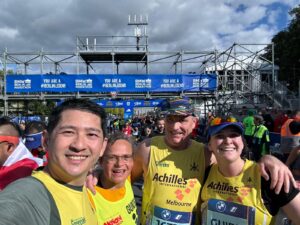
Image description: Four people stand in a crowd smiling into the camera after finishing the Berlin Marathon. The iconic Brandenburg Gate is in view behind them in the far distance. Closer in the distance you can see scaffolding covered in royal blue marathon signage that says ‘BMW Berlin Marathon’ and ‘You are a #BerlinLegend’ in white block text.
Navigating the marathon with guides
Running in Berlin presented unique challenges. When race day came, Peter’s main goal and focus was completing the course safely and enjoying the experience. “I wasn’t worried about time, all I wanted to do was enjoy it, finish it, and be healthy enough to keep running after it without injuring myself. I achieved all that and still got a really good time.”
The marathon’s reputation as a world record-setting competition and its historic setting makes it one of the most popular in the world, and is famously crowded and energetic, with thousands of runners and enthusiastic spectators lining the route. To give you an idea of the sheer scale of the event, in 2024 the Berlin Marathon set a world record with 54,280 finishers – one of five marathons worldwide with more than 50,000 people to finish.
“It was a really big and loud, just fun atmosphere, just happy and encouraging the whole time, but very, very crowded which required constant feedback and guiding – it wasn’t relaxing like running through a forest on a wide trail alone with a guide where you could chat. You had to concentrate.”
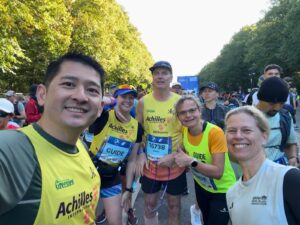
Image description: Five people smiling at the camera stand in a group surrounded by people on the Berlin Marathon track. Trees line the background on both sides of them.
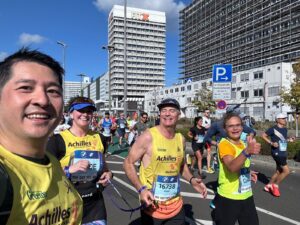
Image description: Four Berlin Marathon runners, including three sighted guides and one blind runner, look into the camera during their run. Buildings and other runners can be seen behind them.
For a runner with total blindness, navigating this densely packed course safely required constant coordination and communication with his guides. “Safety was the first thing, rather than speed. With a big event, you’d usually have two guides – one in front warning others that a blind runner is passing and one guiding – and we wear bright yellow running shirts,” explained Peter.
Although, due to the Berlin Marathon’s size, Achilles arranged for three guides to assist Peter throughout the marathon, including a local from Germany who showed them around before race day. “She took us out on the Saturday before the event to her family’s town Halle, 170 kilometres away, and we did a parkrun in and met her family. She was fantastic. And then she ran the marathon with us,” Peter said.
Using a simple tether and verbal feedback, his guides helped him stay on course, avoid obstacles, and manage the busy streets and tram tracks along the way. Although the noise and bustling crowd made communication challenging at times, they adapted, relying on the tether and touch in addition to verbal communication. “There was one incident where someone cut in front of me and I tripped, but the guide managed to stop me from falling – and that was just someone trying to cut between me and the person in front.”
Officially completing the course in four hours, 38 minutes, and five seconds – Peter was deeply happy with his result. “Getting onto the finishing stretch which is carpeted, running through the Brandenburg Gate, huge crowds, just knowing you’ve achieved the marathon, amazing, you know.”
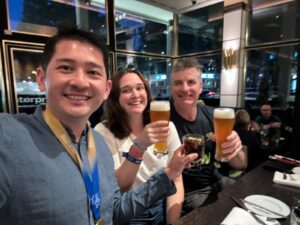
Image description: Three people smiling into the camera sit at a bar after completing the Berlin Marathon. Two of them hold glasses of beer and one holds a cocktail. Large windows line the background behind them and you can see neon signs lighting up the street at night.
Community and support beyond the marathon
Achilles has helped Peter form connections that extend beyond just training. Members often meet up for events outside of the club, sharing a bond rooted in running and mutual support. “Achilles especially likes to get a good group together at a few different events in Melbourne – Run for the Kids, Run Melbourne and the Melbourne Marathon – they’re three events that they really like to encourage members to be part of and there’s all different distances you can do,” explains Peter.
Outside of the social aspect, Achilles offers practical resources, including financial assistance for membership and race fees and team excursions, ensuring that everyone who wants to participate can do so. “It’s the people resource that’s the amazing part of Achilles to me,” says Peter. “They also provide financial support if required and can sponsor three entries per year for events.”
Future goals
Achilles remains an integral part of Peter’s training and social life, and he plans to stay active with the club as long as possible, inspired by older members who continue to run marathons well into their 70s. “I’ll keep going as long as I can. There’s a member in his 70s that just completed his ninth Melbourne Marathon – so I’ll do that for as long as I can and stay part of the community.” With the Berlin Marathon now completed, Peter is turning his sights to local events and, eventually, the Tokyo Marathon in 2025 – which he’ll begin training for in coming weeks using the same regime and coach as for Berlin.
How do I get involved?
Achilles invites anyone with vision loss, blindness or any other disability, as well as sighted guides, to get involved. The club offers the support, camaraderie, and structure that many find essential for maintaining an active lifestyle. “They go out of their way to help you not just on Sundays when Achilles meets, you meet outside at different events and running clubs and they’ve become the people I spend the most time with. We travel together now, go out to dinner and do events. Beautiful people to be around,” Peter shares approvingly with an air of affection in his voice.
Whether you’re interested in running, walking, or volunteering as a guide, joining Achilles could be a fulfilling way to connect with a dedicated community and stay active.
For those who want to learn more about joining, visit Achilles Melbourne’s website where you can view their FAQs, or you can check out their Facebook. The club is always looking for new members and volunteers to join its supportive community.
Looking for other ways to get involved in the community? Check out our Victorian directory of community and peer support groups – there’s something for everyone!


